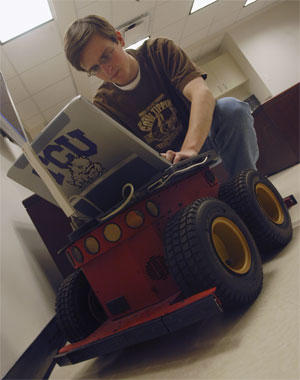Imagine a living environment where elderly people can activate robots to perform routine tasks around the house by voice recognition.This futuristic idea is exactly what faculty and student researchers in the computer science department are working on in collaboration with University of Texas at Arlington researchers.
On a $140,000 grant by the National Science Foundation, the Smart Home, an ongoing area of research in artificial intelligence, was created three years ago in the Sid Richardson Building, said Richard Rinewalt, chairman of the computer science department.
Student lab manager Jonathan Clark said faculty and students are working together to achieve an intelligent system that will provide safety and health monitoring, complete routine tasks and provide entertainment in a home setting.
Charles Hannon said he and Lisa Burnell, both associate professors of computer science, became involved in the Smart Home program through a professor they had while working on their doctorate degrees at UTA.
“UTA received a $1 million grant because they are a major research institution,” Hannon said. “We piggybacked off their grant to get ours.”
The Smart Home has furniture and a fully equipped kitchen and is used by faculty and computer science majors to conduct research and create software for future technology areas, said Clark, a junior computer science major.
“Its goal is to empower the elderly and disabled to live more comfortable lives with the modern shortage of personal health care personnel,” he said.
For example, Clark said, programs associated with the Smart Kitchen have a learning function that will recall meal preferences and food allergies for specified users.
Also, in conjunction with a ceiling-mounted robot, a mobile floor robot will be able to take a TV dinner out of the freezer, heat it in the microwave and deliver the meal to the operator, he said.
Charlie, a virtual human on a computer screen, can track inventory of groceries without ever looking in the pantry, retrieve recipes and ingredients at moment’s notice and plan meals at the touch of a key, Clark said.
“With this agent-based computing system, users are talking not only to a machine but to a human face,” he said.
Rinewalt said unlike a lot of detailed and difficult technology, the Smart Home technology is simple enough to accommodate anyone.
Hannon said research in the Smart Home also provides a valuable learning environment for students.
Clark said he is privileged to be involved with this project because he has been told graduate schools are interested to see students who have research experience.
“The Crescent Lab does all its research with undergraduate students, making TCU an ideal place for undergraduate computer science students,” he said.

